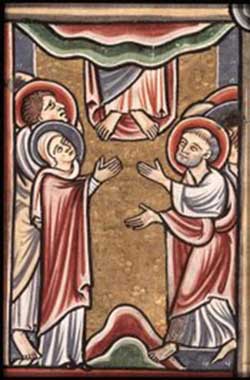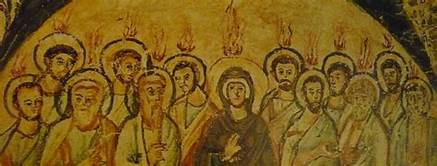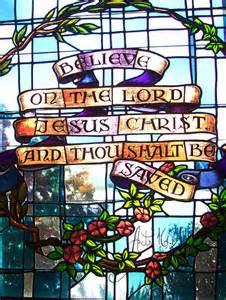
2 Corinthians 8:7-15 (8:7) – June 30, 2024
Remember children on the playground, or maybe your friends or relatives’ children, divvying up some playthings, or some sports equipment, or some dress-up clothes? And then, getting into arguments about how someone had more, or another kid had the best one, or somebody was being overlooked? “Nobody pays any attention to me!” was the cry! “They’re cheating!” was another. “It’s not fair!” was the ultimate complaint.
Things have been that way for thousands and thousands of years. Human nature has not changed one bit. It does not matter whether we are talking about children or adults. We don’t always get what we want. We can’t sit wherever we want to. “He gets more than I do!” “Why is it her turn first?” And it always comes back to, “It’s not fair!”
Except, the apostle Paul is talking about being generous to each other here. In this letter to his friends and former church members in Corinth, Paul congratulates the friends in Corinth for their generosity! He is not able to say this to every group of believers he writes to, that’s for sure! The Corinthians go out of their way to give of themselves! As Paul says, “7 You are so rich in all you have: in faith, speech, and knowledge, in your eagerness to help and in your love for us. And so we want you to be generous also in this service of love.”
A little background here. Some years had passed since the Resurrection and the start of the Church, and the Church in Jerusalem and the surrounding area was very persecuted by the ruling authorities. These believers were – frankly – in poverty, because of the maltreatment by soldiers, by the government, and by their fellow citizens. The believers in the far-away city of Corinth had taken up an offering for the poverty-stricken believers in Jerusalem and the surrounding area, and the apostle Paul was really commending them for their generosity!
Paul’s kind words to his fellow believers make me think about us, today. Christians in Jerusalem are very much like people in dire poverty, today. Christians in Corinth are very much like those living in comfort, today. Just think about the believers in Corinth sending money to the struggling believers in Jerusalem. How does this church send money to people in poverty, today?
How about the Maine Township Food Pantry? Does that feed people in poverty? How about providing paper goods for those who have very little money? I know I have said this before, and it needs to be said again and again. You cannot buy disposable diapers with food stamps. You cannot get feminine products – sanitary pads or tampons – with SNAP cards. These are essential products that young families need.
Let’s look back at what Paul said here. This church in far-away Corinth collected money for their fellow believers whom they have likely never met. This offering binds the two churches – the two communities – together! “To use Paul’s language, this collection shows the believers’ indebtedness to one another and ultimately to the God who is working among them.” [1]
Which draws us to the high point of this reading today: “9 You know the grace of our Lord Jesus Christ; rich as he was, he made himself poor for your sake, in order to make you rich by means of his poverty.” Time after time in these letters, Paul reminds his friends about our Lord Jesus became human, becoming one of us frail creatures. And in our reading today, we see Jesus made Himself ultimately poor for OUR sake. For US.
What an astounding thing to think about! Jesus voluntarily made Himself poor. He took on poverty in this world so that you and I might become spiritually rich. That is so marvelous and astounding, that I almost cannot comprehend it. Plus, Paul then adds to his friends in Corinth that they need to finish the job that they started. Paul acknowledges that they are blessed with much. He says, “since you have plenty at this time, it is only fair that you should help those who are in need. Then, when you are in need and they have plenty, they will help you.”
I want to go back to hungry people, today. I am especially thinking about hungry children. I think all of us here know about children (and grandchildren) who are hungry enough to eat a horse, regularly! There are many families here in this community who do not have enough to feed their hungry children. Many families only get two meals a day, and sometimes even only one meal a day. That is all the food that the family can afford.
When children are hungry, they cannot pay attention in school or to their schoolwork. That is why reduced cost and free lunches are so necessary! Except, what about when weekends come? Or, school is on vacation? And, there are no extra lunches to be had? That is where the Backpack Project comes in. Backpacks are distributed by teachers and social workers at schools to families in great financial need. Quietly, without any fuss or fanfare, and with dignity. This is surely a way to provide for those in need, who do not have enough.
Paul shows us a way to let abundant grace be seen in these believers’ lives and announced to the church as a whole. Besides, giving to the church in Jerusalem is something the Corinthian believers are already doing. “Paul wants us to give, but he wants our hearts in it too, not that the value of our giving is measured by the depth of our desire to give, but that grace is at work in us, evidently at work in us, when our desires match our actions. Paul commended them for their giving, but also for their wanting to give.” And he is encouraging them to keep both the giving and the desire to give going to the utmost. [2]
Can we as believers do the same, today? Give abundantly, with grace?
The apostle Paul tells us we – you and I – we are all one in the body of Christ. This reading tells us we all share as one in the body of Christ. Yes, it’s an ideal. Yes, we freely admit it. “Yet we strive for it anytime we open our hearts. And whether we have more than enough or whether we are lacking, we find help and hope in the body, hope in the relationship within the community of faith to whom we have opened our hearts.” [3]
Paul calls each of us to generosity! Be generous with what we have, always. Open your heart and open yourselves to others, and we will all share as one in the body of Christ.
Alleluia, amen.
(Suggestion: visit me at my other blogs: matterofprayer: A Year of Everyday Prayers. and A Year of Being Kind . Thanks!
[1] https://www.churchofscotland.org.uk/worship/weekly-worship/monthly/2024-june/sunday-30-june-2024-sixth-sunday-after-pentecost-year-b
[2] https://www.workingpreacher.org/commentaries/revised-common-lectionary/ordinary-13-2/commentary-on-2-corinthians-87-15.
[3] https://www.umcdiscipleship.org/worship-planning/open-your-heart/sixth-sunday-after-pentecost-year-b-lectionary-planning-notes/sixth-sunday-after-pentecost-year-b-preaching-notes







